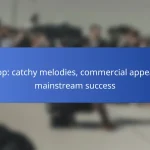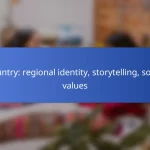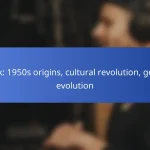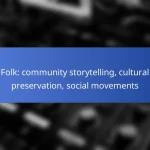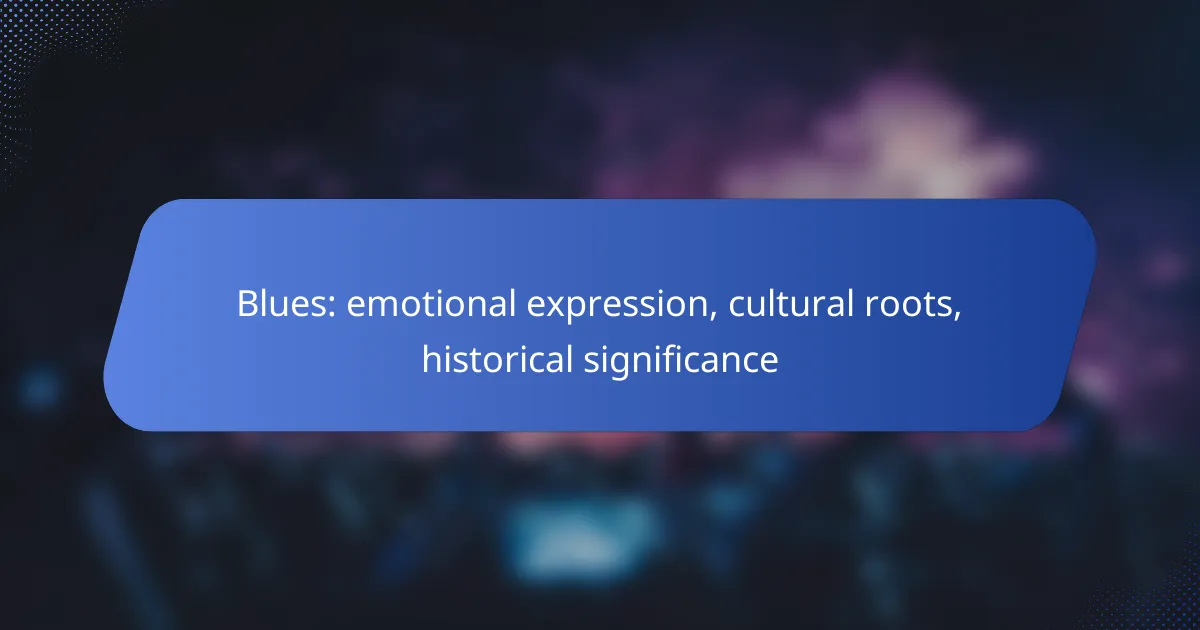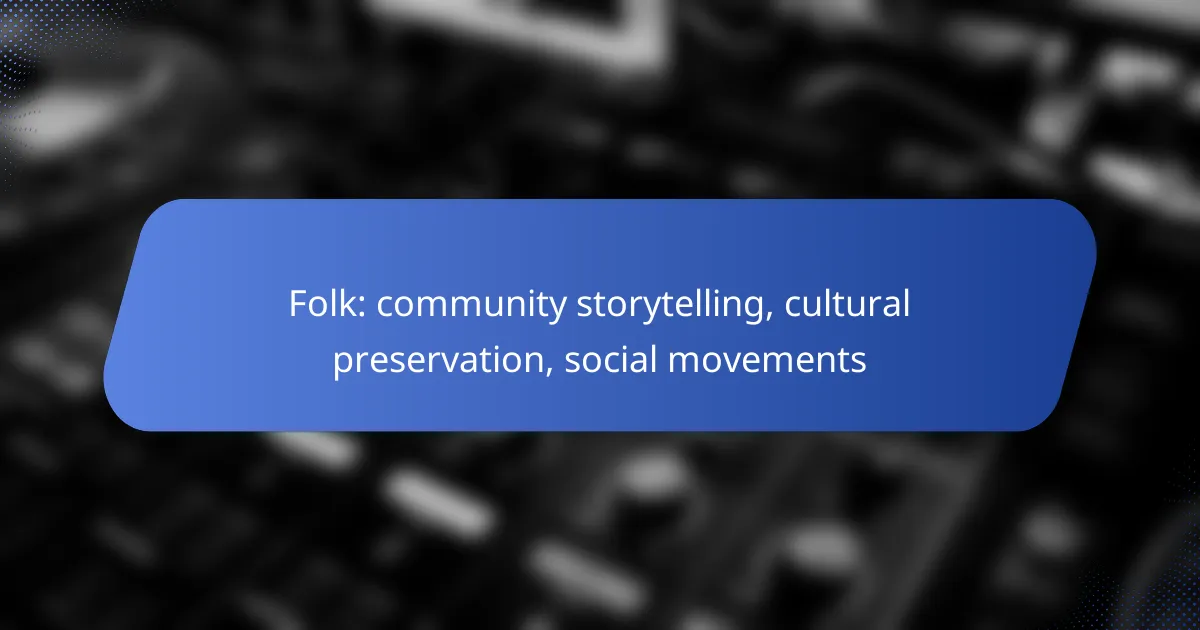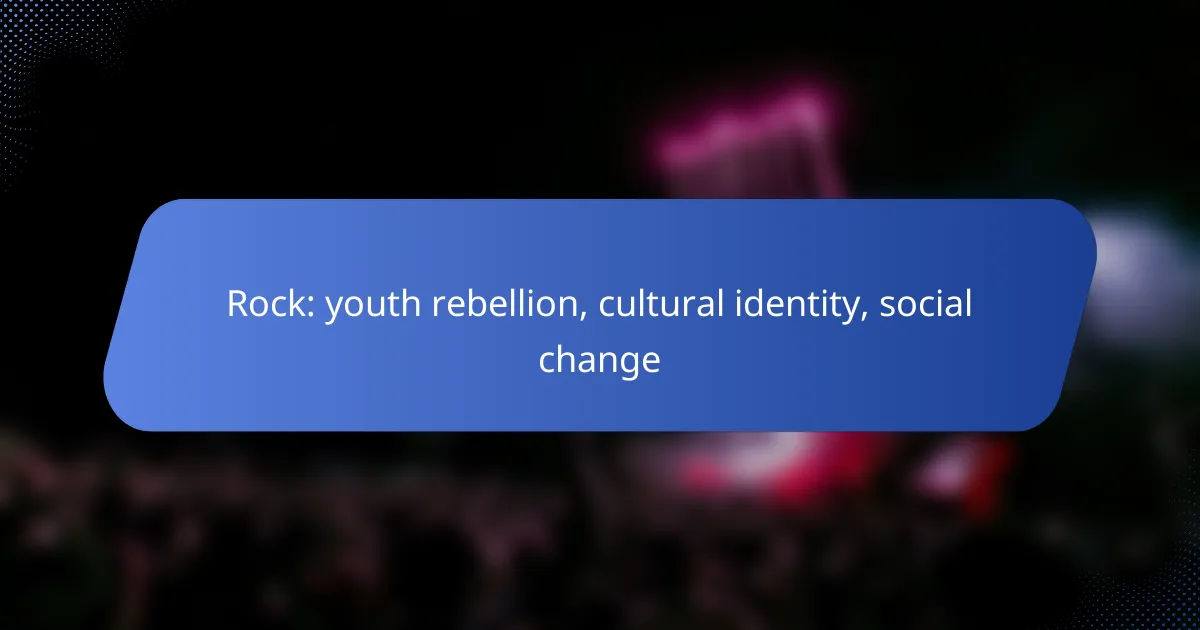Hip Hop in Australia serves as a vital platform for social commentary, empowering marginalized communities and celebrating cultural pride. Through powerful lyrics and performances, artists articulate their struggles and aspirations, fostering self-expression and inspiring social change. This dynamic genre amplifies diverse voices, encouraging individuals to embrace their identities and advocate for their rights.
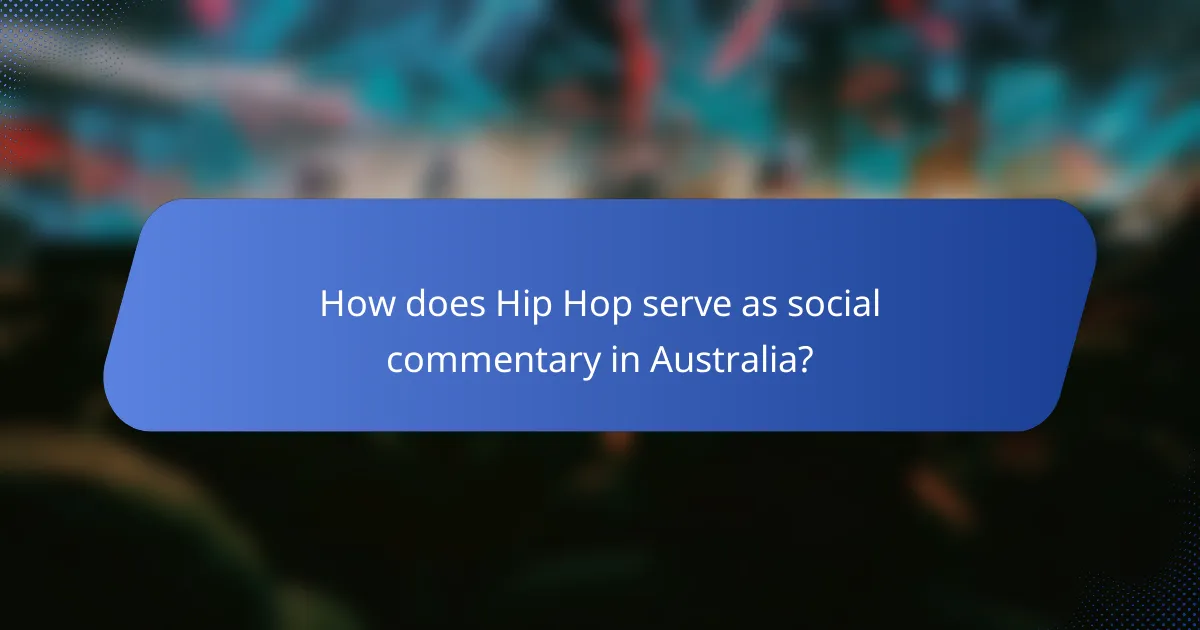
How does Hip Hop serve as social commentary in Australia?
Hip Hop in Australia acts as a powerful medium for social commentary by addressing pressing societal issues, reflecting the experiences of marginalized communities, and fostering cultural pride. Through lyrics and performances, artists articulate the struggles and aspirations of their communities, making their voices heard in a dynamic way.
Addressing social issues
Australian Hip Hop artists often tackle social issues such as racism, poverty, and mental health, using their platform to raise awareness and provoke thought. For instance, many songs discuss the challenges faced by Indigenous Australians, highlighting the ongoing impact of colonization and systemic discrimination.
By sharing personal stories and experiences, these artists create a connection with listeners, encouraging empathy and understanding. This approach not only informs the public but also inspires action and dialogue around these critical issues.
Highlighting inequality
Hip Hop serves to spotlight various forms of inequality present in Australian society, including economic disparities and social injustice. Artists frequently address the gap between different socio-economic groups, emphasizing how these inequalities affect daily life and opportunities.
For example, lyrics may reference the struggles of living in disadvantaged neighborhoods or the lack of access to education and healthcare. By bringing these topics to the forefront, Hip Hop encourages listeners to confront these realities and consider their roles in addressing them.
Influencing public opinion
Through its engaging and relatable content, Hip Hop has the potential to shape public opinion on various social issues. Artists often use their influence to advocate for change, mobilizing their audiences to participate in social movements or community initiatives.
Moreover, collaborations with activists and participation in campaigns can amplify their messages, reaching wider audiences. This synergy between music and activism highlights the role of Hip Hop as not just entertainment, but a catalyst for social change in Australia.
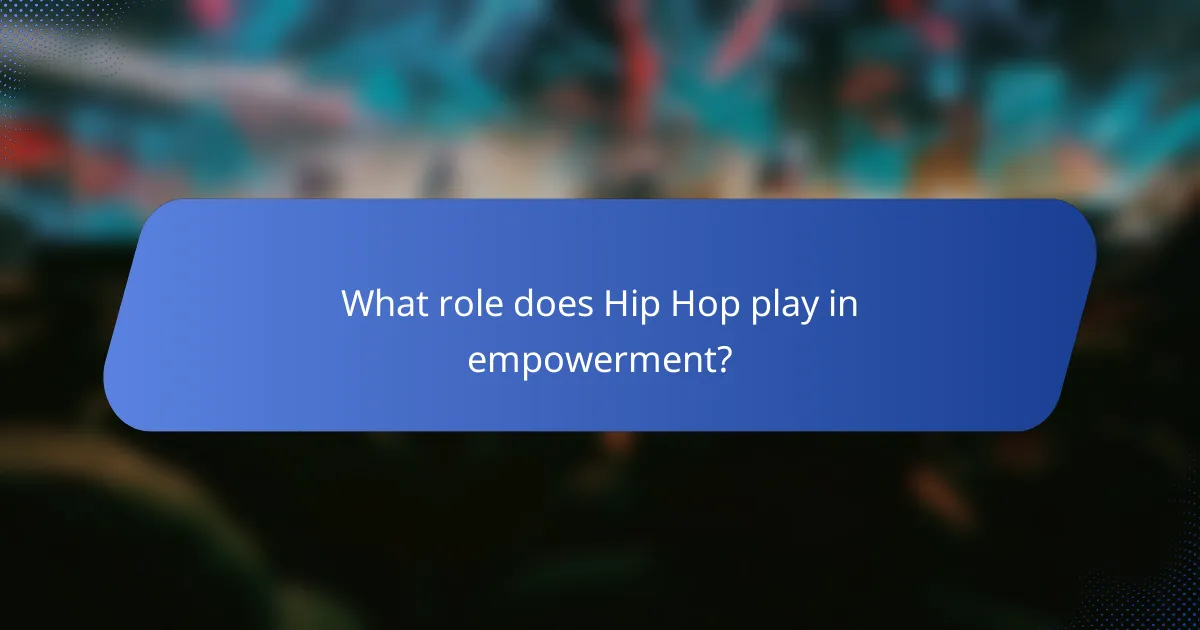
What role does Hip Hop play in empowerment?
Hip Hop plays a significant role in empowerment by providing a platform for voices that often go unheard, fostering self-expression, and encouraging social change. Through its lyrics and culture, it inspires individuals and communities to embrace their identities and advocate for their rights.
Promoting self-expression
Hip Hop encourages individuals to express their thoughts, feelings, and experiences through various artistic forms, such as rap, dance, and visual art. This self-expression allows artists to share personal stories that resonate with their audience, creating a sense of connection and understanding.
For example, many artists use their lyrics to address personal struggles, cultural identity, and societal issues, which can empower listeners to reflect on their own experiences. This form of expression not only validates individual feelings but also fosters a broader cultural dialogue.
Encouraging community activism
Hip Hop often serves as a catalyst for community activism by raising awareness about social injustices and mobilizing collective action. Many artists use their platforms to advocate for causes such as racial equality, police reform, and economic justice, inspiring fans to get involved in their communities.
Events like benefit concerts and community outreach programs are common in the Hip Hop scene, demonstrating how music can unite people for a common purpose. By participating in these initiatives, individuals can contribute to meaningful change while feeling empowered by their involvement.
Supporting mental health awareness
Hip Hop has increasingly addressed mental health issues, breaking down stigmas and encouraging open conversations. Artists often share their own struggles with mental health, which can help listeners feel less isolated and more understood.
By incorporating themes of mental health into their music, Hip Hop artists promote the importance of seeking help and self-care. This awareness can empower individuals to prioritize their mental well-being and support others in their journeys, creating a more compassionate community.
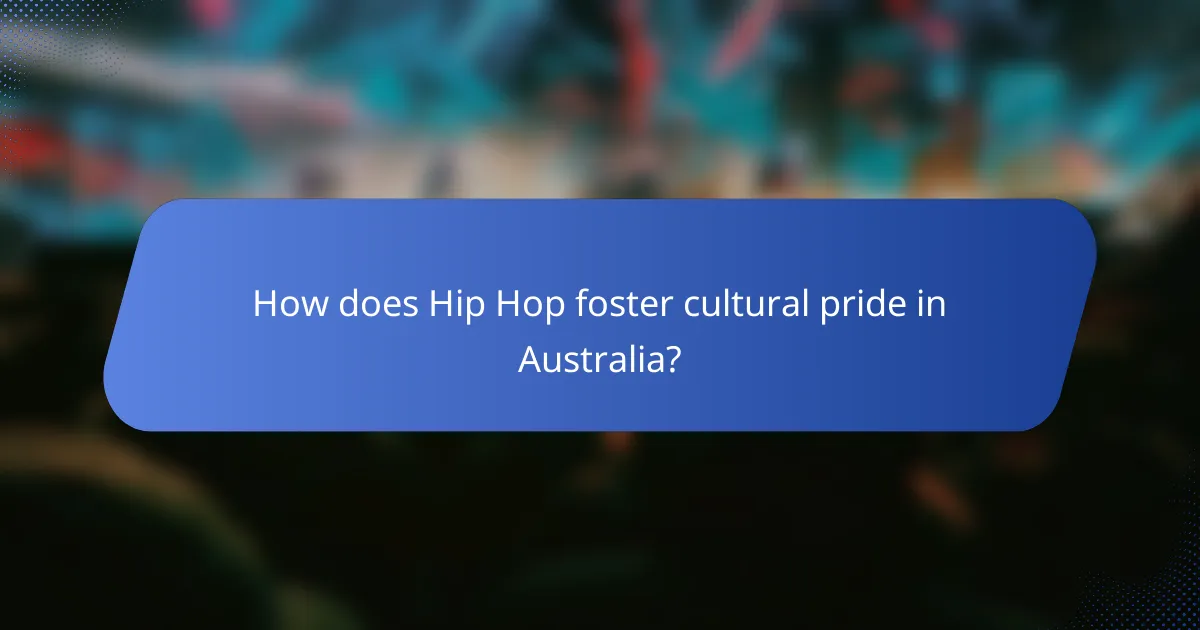
How does Hip Hop foster cultural pride in Australia?
Hip Hop in Australia fosters cultural pride by amplifying diverse voices and celebrating unique identities. Through music, dance, and art, it creates a platform for self-expression and community solidarity.
Celebrating Indigenous voices
Indigenous Australian artists are increasingly using Hip Hop to share their stories and perspectives, creating a powerful medium for cultural expression. This genre allows them to address historical injustices and contemporary issues, fostering a sense of pride and resilience within their communities.
Events like the National Indigenous Music Awards highlight Indigenous Hip Hop artists, showcasing their contributions to the broader Australian music scene. This visibility helps to educate audiences about Indigenous cultures and histories.
Showcasing multicultural influences
Australian Hip Hop is a melting pot of influences, reflecting the country’s diverse population. Artists often blend traditional sounds and styles from their cultural backgrounds with contemporary beats, creating a unique sound that resonates with various communities.
Collaborations among artists from different cultural backgrounds promote understanding and appreciation of multiculturalism. This exchange enriches the Hip Hop scene and reinforces cultural pride among various ethnic groups.
Preserving cultural heritage
Hip Hop serves as a tool for preserving cultural heritage by incorporating traditional narratives and languages into its lyrics and performances. This practice not only keeps these elements alive but also educates younger generations about their roots.
Workshops and community events focused on Hip Hop culture often include elements of storytelling, dance, and art that reflect cultural traditions. These initiatives help maintain a connection to heritage while encouraging innovation within the genre.
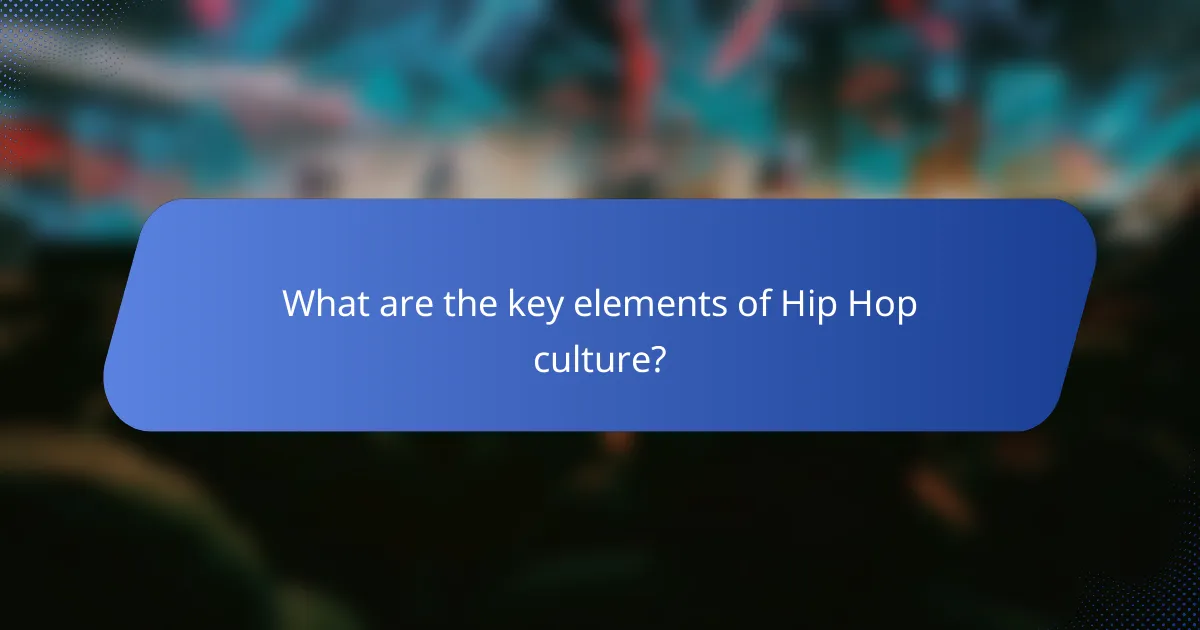
What are the key elements of Hip Hop culture?
Hip Hop culture is characterized by its distinct elements that include music, dance, visual art, and a strong sense of community. These components work together to express social commentary, empowerment, and cultural pride, making Hip Hop a powerful form of artistic expression.
Music and lyrics
Music is the heartbeat of Hip Hop, encompassing various genres and styles, primarily rap. The lyrics often reflect personal experiences, societal issues, and cultural narratives, serving as a platform for storytelling and social critique.
When creating Hip Hop music, consider the rhythm, rhyme schemes, and the message you want to convey. Effective lyrics can resonate with listeners and inspire change, making authenticity crucial in your writing.
Dance and performance
Dance is an integral part of Hip Hop culture, with styles like breakdancing and locking showcasing creativity and physical expression. Performances often occur in battles or cyphers, where dancers demonstrate their skills and engage with the audience.
To excel in Hip Hop dance, focus on mastering foundational moves and developing your unique style. Practice regularly and participate in local events to gain exposure and connect with the community.
Visual art and graffiti
Visual art, particularly graffiti, plays a significant role in Hip Hop culture, serving as a medium for self-expression and social commentary. Graffiti artists use public spaces to convey messages, often addressing political or social issues relevant to their communities.
When creating graffiti, be mindful of local laws regarding public art, as regulations can vary widely. Aim for originality and respect for the spaces you choose, as this fosters a positive relationship between artists and the community.
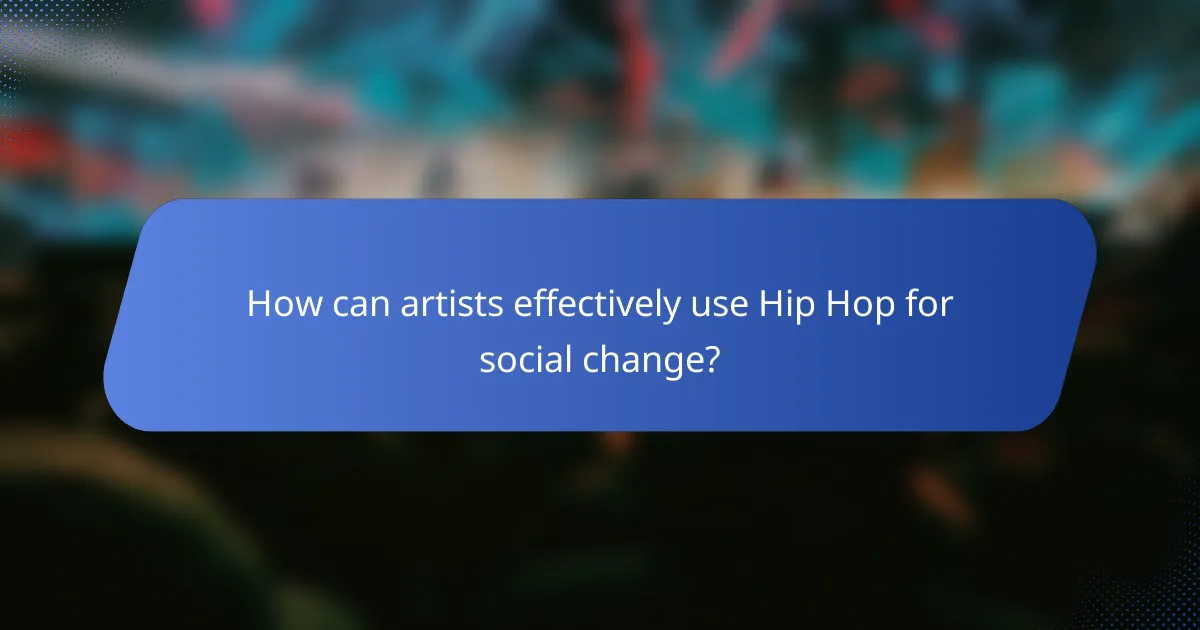
How can artists effectively use Hip Hop for social change?
Artists can use Hip Hop as a powerful tool for social change by addressing social issues through their lyrics, collaborating with community activists, and engaging their audience on various platforms. This genre’s cultural significance allows artists to amplify voices and inspire action within their communities.
Collaborating with activists
Collaboration with activists can enhance the impact of Hip Hop artists’ messages. By partnering with organizations focused on social justice, artists can align their music with real-world movements, creating a stronger narrative that resonates with listeners. For example, artists might participate in campaigns that promote voter registration or raise awareness about police brutality.
Engaging in community events or rallies can also provide artists with firsthand insights into the issues they wish to address. This direct involvement not only enriches their content but also builds credibility and trust with their audience.
Leveraging social media platforms
Social media platforms are essential for Hip Hop artists aiming to drive social change. These platforms allow for rapid dissemination of messages and can mobilize support for various causes. Artists can share their music, personal stories, and calls to action, reaching a global audience instantly.
Utilizing features like live streams, stories, and hashtags can enhance engagement. For instance, artists can host Q&A sessions about social issues or create viral challenges that encourage followers to participate in activism. However, artists should be mindful of authenticity; their messages should reflect genuine beliefs to maintain trust with their audience.
